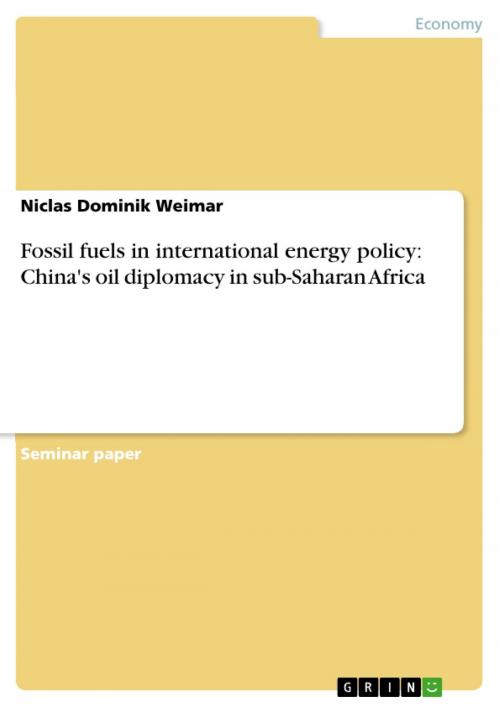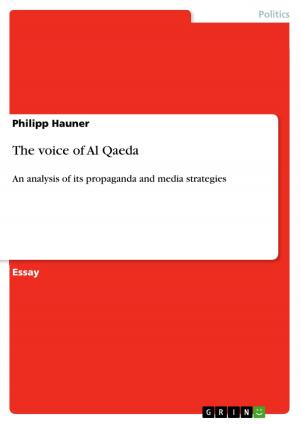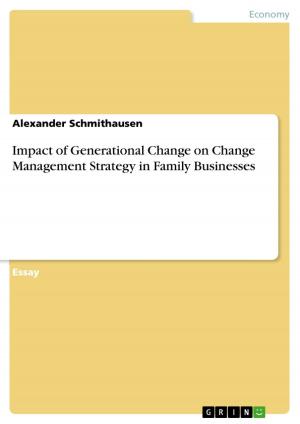Fossil fuels in international energy policy: China's oil diplomacy in sub-Saharan Africa
Nonfiction, Social & Cultural Studies, Political Science, Politics, Economic Policy| Author: | Niclas Dominik Weimar | ISBN: | 9783638837026 |
| Publisher: | GRIN Publishing | Publication: | July 25, 2007 |
| Imprint: | GRIN Publishing | Language: | English |
| Author: | Niclas Dominik Weimar |
| ISBN: | 9783638837026 |
| Publisher: | GRIN Publishing |
| Publication: | July 25, 2007 |
| Imprint: | GRIN Publishing |
| Language: | English |
Seminar paper from the year 2007 in the subject Business economics - Economic Policy, grade: 89, Tamkang University (Graduate School of Economics), course: Energy Policy and Management, 23 entries in the bibliography, language: English, abstract: Since the oil shocks in the 1970s, petroleum has not only proven to be an influential factor in international energy policy and the economical development of nations, but also changed dramatically its perception. With the beginning of the industrial age and in context of World War II, the black gold has increasingly become important as it has been used as fuel in almost the entire sector of transportation or the plastics industries. Conflicts, struggles and wars about oil have used to be the major topics in the fight for access on lucrative resources, proven to be true by looking at Western and Asian government's exertion of influence on countries especially in the Middle East, like Iran, Iraq or Saudi-Arabia, which dispose of huge reserves of crude oil. Nowadays, the rapid economical upturn of the People's Republic of China has been accelerating the race about petroleum. In order to fulfil its needs, Beijing has adopted a strategy of diversifying its import sources and thus sub-Saharan Africa has come to the fore. Therefore, the present term paper deals with China's oil diplomacy in sub-Saharan Africa as it is to analyse China's reasons and the extent of its engagement in this region as well as the implications and impacts that derive from that interests-led diplomacy. Commencing with China's relations to Africa, the quantity and quality of China's investments in the sub-Saharan African crude oil sector as well as the transportation ways of petroleum to the Chinese territory will be explicated, exemplifying the production and investment processes in the top three petroleum producing nations in this region. The main part will be completed by a general description of both negative and positive impacts as well as the consequences of China's oil diplomacy in sub-Saharan Africa and then lead to a final conclusion.
Seminar paper from the year 2007 in the subject Business economics - Economic Policy, grade: 89, Tamkang University (Graduate School of Economics), course: Energy Policy and Management, 23 entries in the bibliography, language: English, abstract: Since the oil shocks in the 1970s, petroleum has not only proven to be an influential factor in international energy policy and the economical development of nations, but also changed dramatically its perception. With the beginning of the industrial age and in context of World War II, the black gold has increasingly become important as it has been used as fuel in almost the entire sector of transportation or the plastics industries. Conflicts, struggles and wars about oil have used to be the major topics in the fight for access on lucrative resources, proven to be true by looking at Western and Asian government's exertion of influence on countries especially in the Middle East, like Iran, Iraq or Saudi-Arabia, which dispose of huge reserves of crude oil. Nowadays, the rapid economical upturn of the People's Republic of China has been accelerating the race about petroleum. In order to fulfil its needs, Beijing has adopted a strategy of diversifying its import sources and thus sub-Saharan Africa has come to the fore. Therefore, the present term paper deals with China's oil diplomacy in sub-Saharan Africa as it is to analyse China's reasons and the extent of its engagement in this region as well as the implications and impacts that derive from that interests-led diplomacy. Commencing with China's relations to Africa, the quantity and quality of China's investments in the sub-Saharan African crude oil sector as well as the transportation ways of petroleum to the Chinese territory will be explicated, exemplifying the production and investment processes in the top three petroleum producing nations in this region. The main part will be completed by a general description of both negative and positive impacts as well as the consequences of China's oil diplomacy in sub-Saharan Africa and then lead to a final conclusion.















